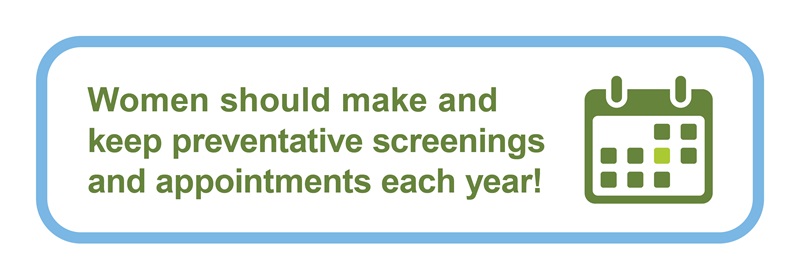
It’s no secret that women are busy. Taking care of family, work and a never-ending to-do list can make it easy to put your health on the back burner. Buckeye is here to help you stay on track and get rewarded along the way.
Earn My Health Pays Rewards® for each of these completed appointments:
- $50 for breast cancer screening (ages 50-74)
- $50 for cervical cancer screening (ages 21-64)
- $50 for annual wellness visit (ages 12+)


More ways to reward yourself with the gift of good health!
Earn more rewards for completing healthy activities like:
- $25 Flu Shot
- Up to $325 for expectant moms
- $25 for completing an Annual Health Risk Assessment form
Spend your rewards on everyday items you need at the store, as well as for rent, utilities and more! Learn more about our My Health Pays Rewards® program and get a list of all the rewards available to you and your family.

Why should you put your health first?
- 1 in 8 American women will be diagnosed with breast cancer in her lifetime.
- Why screen? 85% of breast cancers can be detected by mammograms, and when caught early, the 5-year relative survival rate is 99%.
- More than 4,000 women die from cervical cancer each year.
- Why screen? 1 in 3 cancer deaths can be prevented with early detection through screening. Learn more about what to expect with the screening.
- Nearly half of all women skipped their well visit last year.
- Why go? Annual well visits help prevent disease and find it early when it’s easier to treat. Your doctor will help you:
- Get the right vaccines to help prevent some diseases
- Check health risk factors, like blood pressure and cholesterol, and get treatment if needed
- Get help with chronic diseases, like diabetes and heart conditions
- Learn about other screenings and tests that are right for you
- Why go? Annual well visits help prevent disease and find it early when it’s easier to treat. Your doctor will help you:

Call and schedule your annual appointments today and reward yourself with the gift of good health!
Need help finding a doctor? Click here to use the “Find a Provider.”
Need a ride? Members get no-cost transportation to and from doctor’s appointments. Call 866-531-0615 at least 48 hours in advance to schedule.
Learn more about Buckeye's other programs for women and children:
Start Smart for your Baby® Program
This program provides special assistance for women before, during and after pregnancy. We help make things less stressful for you during this important time. Our goal is for you to have a health pregnancy and give your baby the best possible start to life. You can even earn rewards dollars on your MyHealthPays™ card by completing prenatal, postpartum and infant well-care visits. Please view our Benefits Overview page for more information on how to earn those rewards.
The Start Smart program is a maternal/newborn program that encourages and supports:
- Early Notification of Pregnancy (NOP)
- Member education
- Prenatal care
- Physician’s treatment plan for both pregnant mothers and their delivered babies.
Members can file an NOP:
- Through the Member Web Portal
- By phoning Buckeye at 1-866-246-4358 (TDD/TTY: 1-800-750-0750),
- Mailing to:
Start Smart Program
7700 Forsyth Blvd.
St. Louis, MO 63105-9963
The focus of this program is to identify women at risk for:
- High-risk Pregnancies
- Poor birth outcomes
- Preterm deliveries
The Start Smart Program Coordinators can:
- Provide new mothers with care management for neonatal intensive care unit (NICU) babies
- Arrange for transportation to and from appointments
Pregnancy Information and Guides
- Miscarriage (PDF)
- Breast Feeding your Baby (PDF)
- Newborn Journey (PDF)
- Pregnancy Journey (PDF)
- RSV (PDF)
- Smart Steps (PDF)
- Pregnancy Guide (PDF)
- Pregnancy Guide - Spanish (PDF)
- Your Pregnancy Booklet (PDF)
- Addiction in Pregnancy Program (PDF)
- Goals for a Healthier Me and Baby to Be! (PDF)
- Healthy Moms (PDF)
- Sleep Safe (PDF)
Links & References
Postpartum Visit
Your Recovery: Bouncing Back After Childbirth
- In general, your doctor will want to see you 4 to 6 weeks after you give birth to check on your physical recovery from pregnancy and delivery, see how you're doing emotionally and address your needs going forward.
- If you had a C-section, your doctor will want to check your incision 1 to 2 weeks after delivery to make sure it's healing properly.
Possible topics that your doctor may discuss with you during the PostPartum Visit include:
- Any complications you had during pregnancy and delivery and if they will have an effect on future pregnancies and your overall health.
- What physical symptoms you may still be having, such as whether you're still bleeding on occasion, having any abdominal discomfort, or vaginal pain.
- How you're doing emotionally. Your doctor will want to know how you're adjusting to the demands of motherhood and about any emotional problems you may be having. It's important to let them know if you're feeling overwhelmed, anxious, or depressed.
- Whether or not you're breastfeeding – and, if so, how it's going.
- Your options for birth control.
- Whether it's okay to start having sex again. You will probably get the go-ahead, but don't worry if you don't feel up to it yet. Many women don't feel like having sex for several months after giving birth. Wait until you feel ready.
- Diet and exercise, including Kegel exercises, to help strengthen your pelvic floor muscles.
During your physical exam, your doctor will:
- Check your weight and blood pressure.
- Check your abdomen. They will feel your belly to be sure that there's no tenderness and check your incision if you had a C-section.
- Examine your breasts. They will be looking for lumps, tenderness, redness, and cracked nipples or abnormal discharge.
- Inspect your external genitalia, including your perineum. If you had an episiotomy, they will check to see that it's healed.
- Do a speculum exam to look at your vagina and cervix to check that any bruises, scratches, or tears have healed. And, if you're due for a Pap smear, it will be done during the speculum exam.
- Do an internal pelvic exam to feel your uterus and check that it has shrunk appropriately, feel your cervix and ovaries to identify any problems, and check your vaginal muscle tone. Your doctor may do a rectal exam as well.
Helpful Links & Resources
Cervical Cancer
What Every Woman Should Know: Cervical Cancer
In 2017, The American Cancer Society estimates:
- There will be about 12,820 new cases of invasive cervical cancer diagnosed.
- About 4,210 women will die from cervical cancer.
Cervical cancer, however, rarely occurs in women who have been getting regular tests before they turned 65 years old. Please click for a Cervical Cancer Infographic from the CDC (PDF).
Breast Cancer
- The Science Behind the New Breast Cancer Screening Guideline Video
- Mammogram Informational Guide (PDF)
HPV
Links & References
Well Child Visits are preventative healthcare for children under the age of 21 and are important for your child's health.
Vaccines/Immunizations your Child Should Receive and When:
Instant Childhood Immunization Schedule:
Helpful Links
Infant Safe Sleep Information:
Center for Disease Control and Prevention:
- Child and Adolescent Immunization Schedule, Ages 18 Years or Younger
- Adult Immunization Schedule, Ages 19 Years or Older
Ohio Department of Medicaid:

